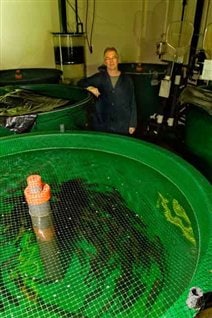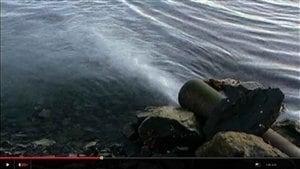A new study from the University of Ottawa has again highlighted the concerns of pharmaceutical drugs escaping into the environment.

facility at the university © University of Ottawa
In recent years scientists have detected traces of a wide range of pharmaceuticals and other chemicals in waterways.
Building on previous research in 2010, which dealt with the effects of environmental levels of Prozac, a commonly prescribed anti-depressant drug, on fish, this new study looked at the effect on fish when traces of Prozac were mixed with traces of the estrogen, ethinyl-estradiol. This estrogen from birth control pills, is also commonly detected in waterways.
Dr Vance Trudeau is the Research Chair in Neuroendocrinology in the University of Ottawa’s Biology Department and co-author of the study.
ListenThe initial study found that the drug commonly used in Prozac, affected male fish in that they no longer reacted to female spawning pheromones.
Other studies involving trace amounts of pharmaceuticals have showed similar negative effects on fish.

The newest study involved a “cocktail” of the antidepressant combined with estrogen, both of which (along with many other chemicals) can be found in trace amounts in treated sewage water released into the environment.
The University of Ottawa study showed the “cocktail” also upset the goldfish metabolism in addition to a negative effect on reproduction.
Dr Trudeau says that when people take drugs, such as antidepressants or birth control pills, these are not 100% absorbed into the body and trace amounts are released into sewage. He say are sewage treatment plants were not designed to deal with pharmaceuticals and these trace amounts are being released from the sewage plants into the water systems where they are having an adverse effect upon fish and other aquatic creatures.

In several places in Canada, sewage treatment is inadequate with effluent going directly into the water.
He notes that the fish absorb these chemicals and then when fish are caught and eaten, we are absorbing the chemicals as well. He adds there are some controversial studies he says, that show tiny amounts of the chemicals may also be getting back into drinking water. In both cases he says very little is known about what the effects might be, especially for children whose bodies are still developing.
He says studies like this point out the need for action to retrofit sewage treatment plants to deal with the issue of pharmaceuticals and other chemicals. He says the costs now are high, but will absolutely be much higher still if delayed.
Dr Trudeau says that individuals should always take the medicine in the recommended doses and should never throw unused medicines in the garbage or flush them down the toilet as this will automatically ensure these pharmaceuticals will end up in the environment.
He says unused medicines should be returned to a pharmacy for proper and safe disposal.
Environmental Science and Technology
Issue of May 21 with research article (Vol 47 #10)
University of Ottawa, Dr Vance Trudeau page







For reasons beyond our control, and for an undetermined period of time, our comment section is now closed. However, our social networks remain open to your contributions.